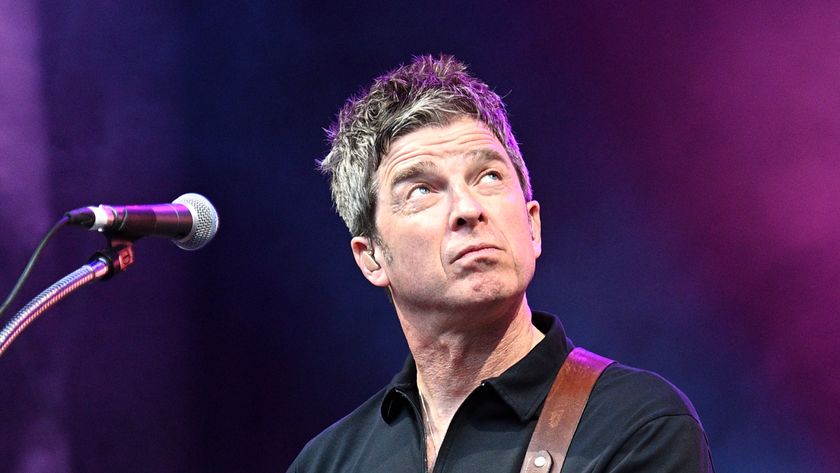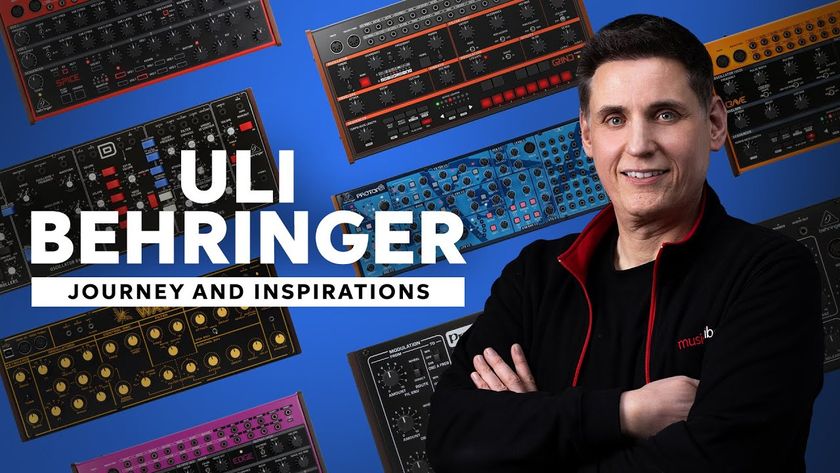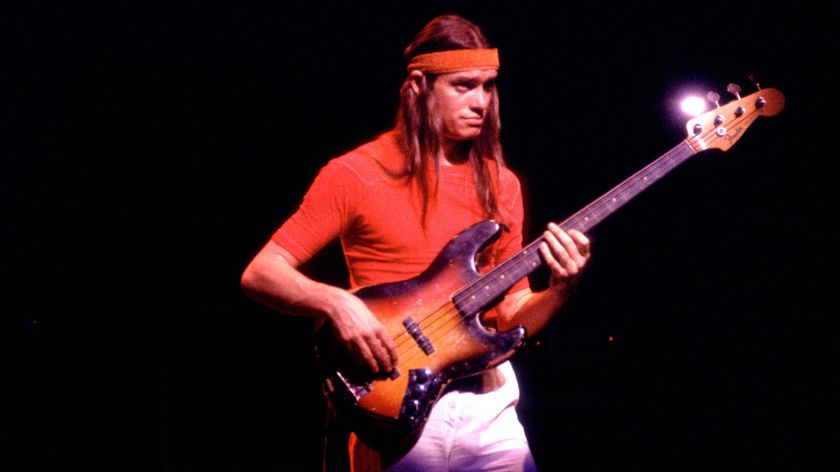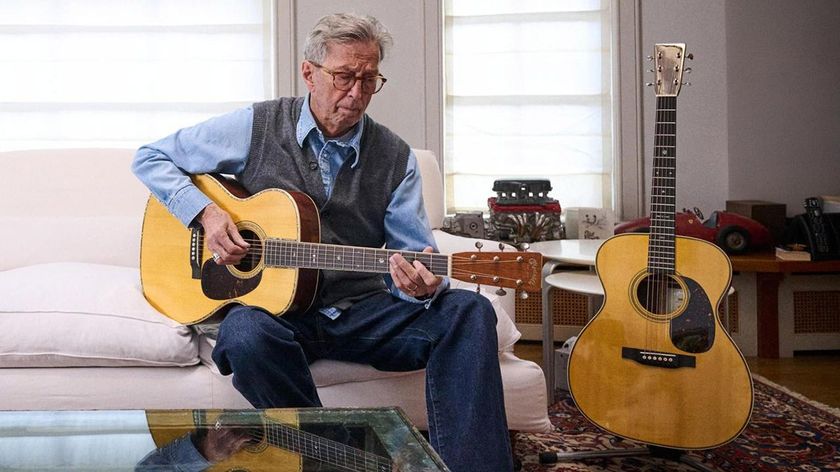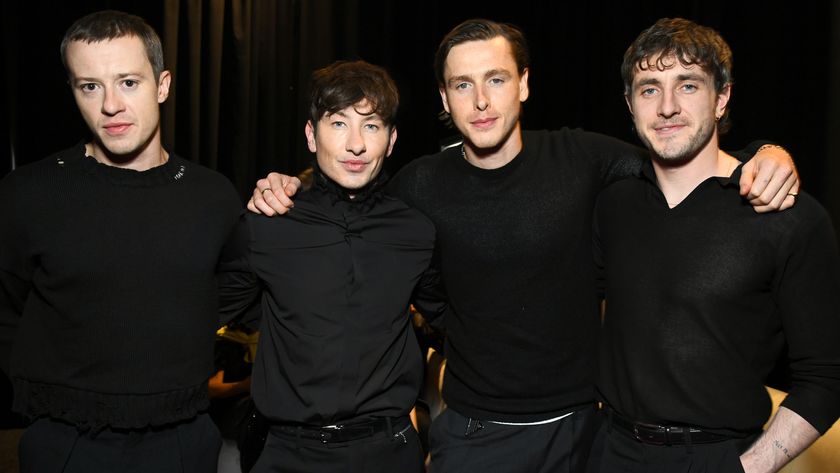Dream Theater's Mike Mangini: "I was afraid that I couldn’t do it"
Prog maestro on joining DT, Steve Vai, his influences, visualising music, and much more

Visualising the beats
Six years have now passed since Mike Mangini aced his audition and earned his spot behind the kit for Dream Theater.
A lot has happened in the intervening years. Not least, the band has put out three studio albums and two live records. But, we shouldn’t be surprised that Mangini’s introduction to the band has been so seamless.
The Massachusetts-native has built a career fitting perfectly into bands looking for a gob-smackingly-talented drummer who is also as reliable as clockwork.
Mangini got his big break in the mid ‘90s with Extreme, before landing the gig with guitar maestro Steve Vai in 1996. Mangini shifted gears in 2005 when he took up a full-time teaching position at the world-renowned Berklee College Of Music. Perhaps his days as a full-time touring musician were over? Not quite.
In 2010, after the band’s very public split with founding drummer Mike Portnoy, Mangini beat several high-profile names (including Thomas Lang and Marco Minnemann) to the Dream Theater gig, bringing us full circle.
Mangini is out on the road with the prog rock titans when we catch up with him. It is actually also his birthday when we settle down in the bar of a luxury hotel just a stone’s throw away from the venue for tonight’s gig, Birmingham’s Symphony Hall - and what better way to mark the occasion than by spending an hour discussing his career, past, present and future?
What was your introduction to drums?
“I was two-and-a-half and when my older brother and sister played LPs I was able to look at the drums and understand what I was hearing from shape. In other words, I was hearing and basically seeing the ascending and descending tones as shapes. I was able to get on a real drumset and perform when I was four.”
Did you take lessons early on?
“I was self taught, they say by ear, but for me it was by eye. Yes, I listened but I visualised and that’s what made it easy for me. I took some reading lessons but I didn’t really study formally until age ten.”
I was self taught, they say by ear, but for me it was by eye.
Did that ability to visualise the music have a big impact on the style that you developed?
“It has a big impact on everything. Eventually when I started to teach I realised I could not answer the questions I was asked in a way that made me feel like I knew what I was talking about. That led to a lot of self-study and research on the human brain and specifically memory and then philosophy.”
Who were your early drumming influences?
“I can name them in order. Ringo Starr was the first, Bobby Colomby from Blood, Sweat and Tears was second. Danny Seraphine from Chicago, Buddy Rich was fourth. I was taken to see Buddy by my brother and of course that had an impact on me. John Bonham was next, Neil Peart and Terry Bozzio.
"Those seven drummers are important to name even though there must be 346 drummers that have influenced me including Steve, Gadd, Bill Bruford and Tommy Aldridge. But those seven, I emulated their entire catalogues as much as I could. Those seven drummers carried me into my early twenties and then I disappeared and didn’t listen to much of anybody.
"I had to find myself and make sure I wasn’t a creepy copier of other people. Even though that is what I have ended up doing for most my career, getting into bands and having to copy the guy before me! If I don’t then I’m not playing the songs the way people know them. Go figure, the one thing I’ve tried to get away from is my life, but I’m having a ball.”
What was the point where you realised that music was your career?
“There still hasn’t been that point. I pray a lot for wisdom and guidance because decisions we make on a daily basis are really important. I value that as I get older. I wish I had valued that more in my younger years. I wish I had valued the gifts I was given from people with experience. But, maybe when I was laying on a tour bus with Extreme in 1994 and I thought, ‘Maybe this can be my job now.’ But then it wasn’t because after playing with Steve Vai I took a job at the College.”
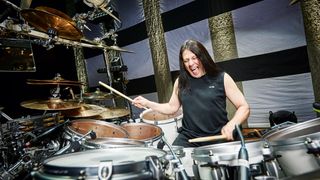
Drumming to the Extreme
How did that Extreme gig come about?
“It’s all through being in a certain place leading to relationships leading to opportunities. I joined a Van Halen tribute band and Nuno Bettencourt heard me practicing through our rehearsal room wall.
"He literally broke the lock off the door, he kicked it open and introduced himself, pink hair, streaks and all. I had heard him play and thought, ‘Wow, that person needs to be in my life.’
Was there an audition or had he heard enough through the rehearsal room wall?
“I think he had heard enough. During the making of Three Sides To Every Story he wanted me there at some point. I’m not saying this in any disrespect to Paul Geary. Paul did a fantastic job musically and I emulated him. I like his playing and I like him. Paul has a gift that I wish I had, he has a gift for the music business and having a perspective on things. I didn’t have that, I had more of a technical view.
"I had a more narrow-minded view, ‘Me hit drum, boom.’ He had a global view of things. I would have loved it if I had played drums and he had managed the band. I believe at one point Paul’s heart was more into managing rather than doing what I was doing and banging the drums for six hours.
"That doesn’t make one thing better than the other, each person has a valuable gift. I wish I could go back in time and change some things that I did, said, wished, wanted, all those things but you don’t know certain things until certain points in your life.”
What kind of practise were you putting in during the pre-Extreme days?
“In the early days I was engrossed with practising individual things that took hours and hours, weekly, monthly and yearly. That led to certain decisions in my life where I just stiff-armed, I blocked everything and everybody that got in my way. I went broke many times, I had to be rescued by my father.
"A number of times I had to go crawling home and he was there having warned me not to do this as a job. I didn’t have perspective. All I knew was that if you were getting in my way then you were getting in the way of my calling. I felt this calling was deeply spiritual and you weren’t going to get in my way.
"That led to me sacrificing things like my health, relationships, finance, all kinds of things. Nothing would get in my way because I didn’t have the full perspective.”
I joined a Van Halen tribute band and Nuno Bettencourt heard me practicing through our rehearsal room wall. He literally broke the lock off the door, he kicked it open and introduced himself
Through all of that did you know that you would eventually get there?
“I didn’t know what I knew, I didn’t know what it was until I spent a lot of time reading and researching. It’s like this, you can pay $25 for a book which contains 300-400 years worth of knowledge, that’s a good way to spend $25. I can spend $25 on a few beers that I will just pee out. What do I get for that $25? Well, it might be a little fun but that book could change my life.”
What were the highlights of your time with Extreme?
“With Extreme I remember the joy of the phone call from Nuno, the joy of seeing the other guys, the joy Pat Badger ribbing me because I was the new guy and even the joy of giving Paul a hug. I remember those things instead of why it broke up. I don’t even remember why it broke up. Well, I could if I wanted to but I don’t want to.”
Next, you joined Steve Vai’s band. How did you land that gig?
“That gig came with the help of another drummer, Jonathan Mover. I am so in-awe of what Jonathan has done with his life. People like Jonathan have ability and perspective at the same time. He did something very kind for me, he gave Steve Vai’s manager a video cassette of me and Steve sat down and watched it.
"Mutual friends told me that Steve Vai would be a musical soulmate of mine for life and they were right. I absolutely love that guy.”
So, you quickly struck up a musical partnership?
“Yes. He knew that I respected his position. He had a lot of things to say about what I should play but there was a joy when he literally told me what to do. I have had times in my life where I haven’t wanted to be told what to do, I have my vision.
"I like hearing other people’s opinion and I fuse them in, but at that time in my life I enjoyed him treating me literally like a drum machine and telling me things because he was telling me extraordinary things to try. It was so much fun. When anyone mentions Steve Vai I see his smiling ace above everything else.”
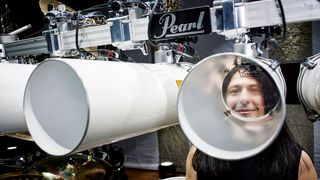
Here comes Dream Theater
You then took up a full-time position teaching at Berklee. At that point did you think your days of full-time touring were over?
“It was a tumultuous year for me. My soul was being ripped apart. I was confused. My love of teaching is so deep, partially in a selfish way because I need to teach in order to progress and evaluate things.
"My calling is also to be an educator but not from a perspective of knowing stuff and teaching people things. I don’t learn unless I am in that position because I feel a sense of responsibility and I don’t want to influence people poorly.
"I love that and I loved my colleagues. But over time I was able to do less professional work because it interfered with what some administrator saw as too much time away from the school. I’m not stupid, I understand that they hire you to teach and you need to teach, but there has to be a balance. Some things bothered me from a political perspective but I was very grateful for the opportunity.
"Also, I couldn’t practise as much because of all of the things that go into working in a building in a busy city – the travel, the traffic, the parking. My body fell apart because I wasn’t practicing, I ended up needing knee surgery. I was just looking for work to supplement my income because there wasn’t enough money from a professor’s salary to have a family and a house. It was all too much for me and what bothered me the most was that I loved it, I adored my students and colleagues.”
When was the opportunity of auditioning for Dream Theater first put to you?
“It was first put to me when I saw that Mike quit. I got contacted by their management asking if I was interested in auditioning. I said yes and had two of the three busiest weeks of my life, it was awful timing.
"I had my first week of the year at Berklee and then I did eight clinics in nine days in South America. I was transcribing the music on the plane and I won the audition, go figure. I didn’t have a lot of time to think. I just had to go do the best I could.”
I was afraid that I couldn’t do it.
Did having previously played with James LaBrie help you settle into the band?
“There was speculation that my knowing James had anything to do with me getting the gig, people thinking that are sorely wrong. It had nothing to do with that. In fact, he couldn’t play favourites because he was working with Peter Wildoer who is an incredible drummer. But, that previous relationship that I had with James was important because we got along.”
How did you approach recording your first album with the band, A Dramatic Turn Of Events?
“I went into athlete mode. I always wanted to be an ice hockey player even more than a musician. Still to this day I don’t read up on music, I don’t buy a lot of records. I know sports statistics for the last 40 years but given what I do I don’t know crap about music. So, I went into athlete mode and thought, ‘What’s the job, what do I need to do here?’”
Was there extra pressure given that you were replacing one of the founders of the band?
“The whole stigma of replacing someone is nonsense. Someone left their job and I took the job. End of discussion. Of course, it can’t be that simple. The other thing is that I hurt my wrist and couldn’t move it for eight days so I showed up not really being able to play the material.
"I was afraid that I couldn’t do it. I had to go with the flow with what my sound was going to be. My experience with Vai helped me in showing up and playing what was needed to be played. It’s not easy to do that.”
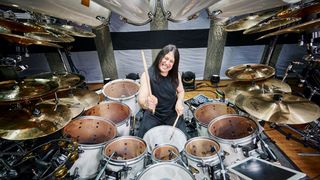
The evolution of Mangini's drum kit
Jumping on to the band’s most recent album, The Astonishing. How did that experience compare to A Dramatic Turn…?
“It was ten times as difficult in a way because I had already been in the band and then I had nothing to do with the creating, composing and polishing of what the record turned out as. I had less to do with it from beginning to middle to end. That was hard to just show up and play. I improvised it.
"I gave 120 percent to what I was asked to do. I had to just sit at my drumset, listen to guitar and piano and play to it. John Petrucci was clear on the material and that was helpful. I can trust John, if he has an idea for something I can go with the flow because I have that respect for him. It was the same with Steve Vai and also with Nuno Bettencourt.”
Has the old Dream Theater material evolved since you joined the band? Have you put your interpretation on those beats?
“If something has been done then it has been done already so I need to respect what’s there. The way that I adjust it is through orchestration. I will flip things around, especially in my ghost notes on the hi-hat, ride and snare drum. The way that I change key signatures on my drums through tone is something else that I do differently to any other drummer that I have ever replaced.
"Yeah, it might be a simple beat but I might switch from lefty to righty. That might not be a big deal but when it is projected properly in the production and you can hear it properly exactly as I hear it, it makes a big difference.”
I might do the next Dream Theater record with my clinic kit instead of a big kit, I don’t know. That is less important to me than with people that want to care about it more than I do
How has your gear evolved down the years?
“This comes down to the philosophy of shape and form. I like to get a perspective of things by drawing my thoughts. When I have decisions to make I like to draw a picture of myself in a situation. I don’t do that enough, I wish I did it more, I’d have made fewer mistakes.
"The evolution of my kit is about submitting to something. ‘Okay, I’m joining Dream Theater, how can I expect the fans to think it sounds like Dream Theater unless I use some of the same drums that Mike use?’ So, I added a few cymbals for Mike’s vintage sound and added some toms.
"I looked at the big picture and went to work. I looked at what my objective was. I’m writing a lot of solo music now and I’m considering going with less drums, mainly because I might have to carry them around one day [laughs].
“But I might do the next Dream Theater record with my clinic kit instead of a big kit, I don’t know. That is less important to me than with people that want to care about it more than I do. The people that ask why I use this stuff or why does my drum kit look like it came out of Home Depot.
"There’s a proverb that goes something like, the person that says to another that it cannot be done should not bother the person doing it. Why are people using their energy to worry about what I’m choosing? I’m neutral on it because I like people to express themselves but I do not bother myself with it. The kit is going to keep changing, the evolution of the drum kit is going to keep changing.”
Do you have a desire to be at the forefront of the drum kit’s evolution?
“I have no problem being the first person to do something or being the twelfth person or whether I copied someone because I have no problem saying, ‘I copied this person and thank you very much.’ I have said that about my peers like Terry Bozzio and Neil Peart and so many of my drum heroes.
"I openly thank them for blazing a path and saving my time because I have used some of their things and I wouldn’t exist without them. They are all greater than me because I can’t exist without them.”

Rich is a teacher, one time Rhythm staff writer and experienced freelance journalist who has interviewed countless revered musicians, engineers, producers and stars for the our world-leading music making portfolio, including such titles as Rhythm, Total Guitar, Guitarist, Guitar World, and MusicRadar. His victims include such luminaries as Ice T, Mark Guilani and Jamie Oliver (the drumming one).
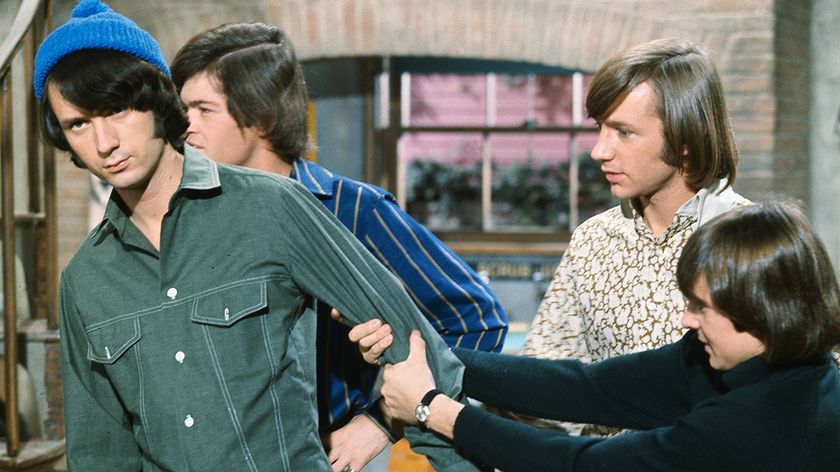
"They said, ‘Thank you, but no thank you - it’s not a Monkees song.’ He said, ‘Wait a minute, I am one of the Monkees! What are you talking about?’": Micky Dolenz explains Mike Nesmith's "frustration" at being in The Monkees
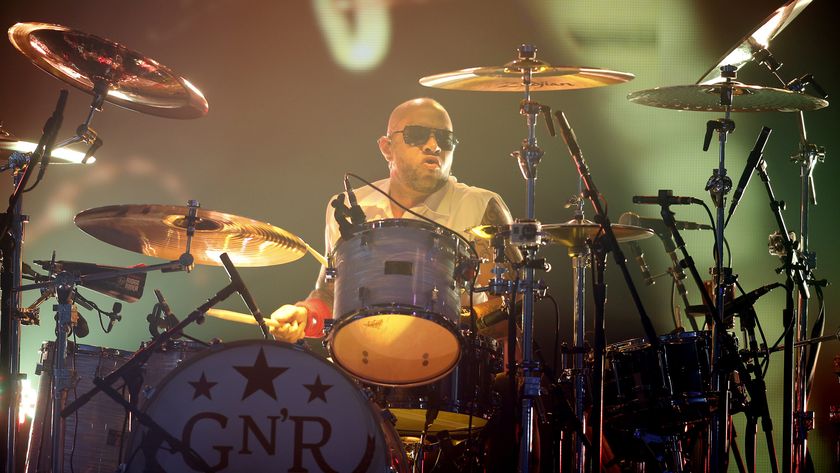
“There’s nights where I think, ‘If we don’t get to Paradise City soon I’m going to pass out!’”: How drummer Frank Ferrer powered Guns N’ Roses for 19 years

"They said, ‘Thank you, but no thank you - it’s not a Monkees song.’ He said, ‘Wait a minute, I am one of the Monkees! What are you talking about?’": Micky Dolenz explains Mike Nesmith's "frustration" at being in The Monkees

“There’s nights where I think, ‘If we don’t get to Paradise City soon I’m going to pass out!’”: How drummer Frank Ferrer powered Guns N’ Roses for 19 years
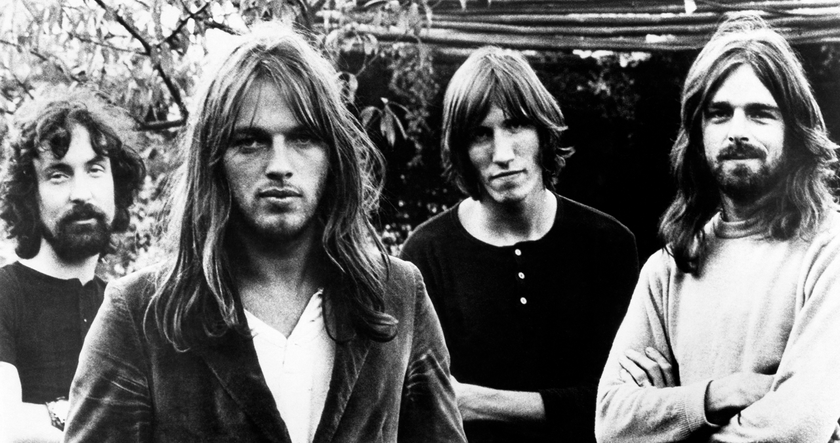


![Chris Hayes [left] wears a purple checked shirt and plays his 1957 Stratocaster in the studio; Michael J. Fox tears it up onstage as Marty McFly in the 1985 blockbuster Back To The Future.](https://cdn.mos.cms.futurecdn.net/nWZUSbFAwA6EqQdruLmXXh-840-80.jpg)
